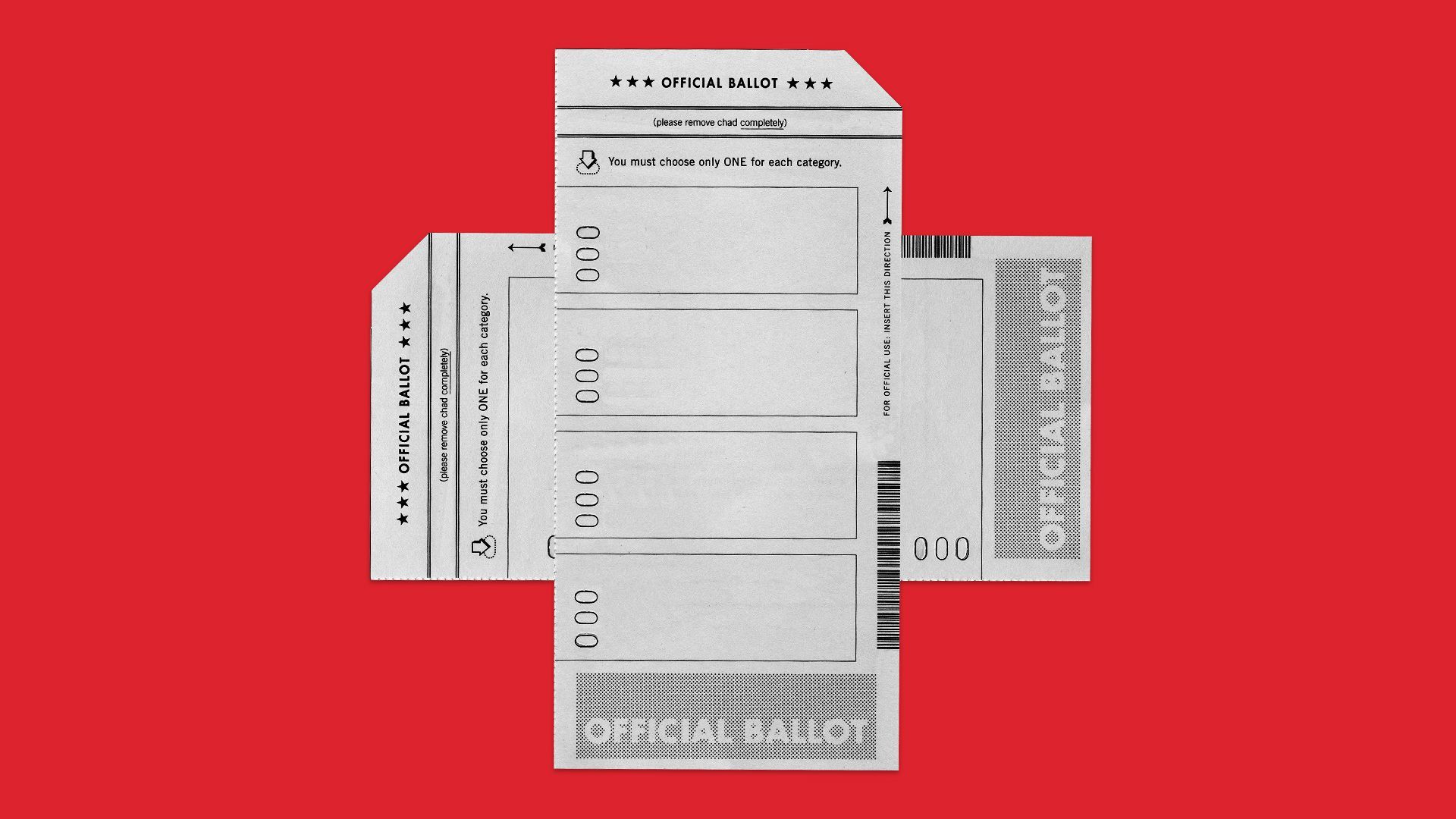| |
| |
| |
| Presented By PhRMA |
| |
| Axios Vitals |
| By Tina Reed · Nov 10, 2022 |
| Happy Thursday, Vitals readers. Today's newsletter is 1,039 words or a 4-minute read. 🇺🇸 Programming note: We will not publish Vitals on Friday in observance of Veterans Day. A special thank you to all those who've served and their families. |
| |
| |
| 1 big thing: Republicans poised to take power without a health care agenda |
 |
|
| Illustration: Gabriella Turrisi/Axios |
| |
| For the first time in more than a decade, a party without a definable health care agenda is on the cusp of a new congressional majority, all but ensuring that next year's agenda will be driven by real-world events more than campaign promises, Axios' Caitlin Owens writes. Why it matters: Republicans have been eager to move on from health care for years, but a series of jarring events may draw them back in. The big picture: The Affordable Care Act — both its passage and Republicans' attempt to scrap it — was a rallying point for both parties until 2018, when the GOP's failed repeal attempt helped cost it control of the House. - Health care remained central to Democrats' agenda over the last four years, culminating under the Biden presidency in enhancements to the ACA and a new law allowing Medicare to negotiate drug prices.
- House Republicans' vaguely worded health agenda references price transparency, telehealth and health savings accounts, hinting that the party's goals are much more small-bore than in the past.
Reality check: Avoiding health care assumes the issue will largely be background noise to voters. But economic circumstances and policy cliffs will make it hard for a sector accounting for nearly 20% of the economy to just run on autopilot. - Inflation will be increasingly reflected in health care prices, and a potential recession will make it more difficult for patients to pay bills.
- If hospitals and providers can't pass along rising labor and supply costs, some will experience severe financial challenges.
- The COVID public health emergency will end and millions could get purged from Medicaid.
- New multi-million dollar drugs are hitting the market, threatening state Medicaid programs and small employers' balance sheets.
What we're watching: Whether some combination of factors creates enough pain to force Republicans to return to one of their least-favorite subjects. - The narrower their majority, the worse news that is for the party — and potentially for patients.
Go deeper: The second and final pre-launch edition of Health Care Pro will dive into more detail on the GOP health agenda. Sign up here. |
    |
| |
| |
| 2. GOP's abortion silence backfires in midterms |
 |
|
| Illustration: Natalie Peeples/Axios |
| |
| The blame game has begun around what led to Republicans' disappointing results in the midterms, with political groups zeroing in on the party's lack of abortion messaging, Axios' Oriana Gonzalez writes. Driving the news: Susan B. Anthony Pro-Life America, a large anti-abortion organization with close ties to GOP leaders, slammed Republicans who distanced themselves from abortion bans and failed to clearly communicate their stance on the issue, calling it "political malpractice." - The group said in a memo that to "win in competitive races," candidates needed to focus on defining their opponents as "abortion extremists" and "contrast that with a clearly defined pro-life position centered around consensus such as pain-capable or heartbeat limits."
Zoom in: Republicans are typically outspoken in opposing abortion, particularly during the primaries. What we're watching: Dannenfelser told reporters her group is already looking at how it can improve their odds in 2024. |
    |
| |
| |
| 3. Court challenge looms over California's flavored vape ban |
| Californians on Tuesday voted in strong numbers to ban the sale of flavored vapes and menthol cigarettes. But the Supreme Court may yet have the final say on the matter, Axios' Arielle Dreher writes. The big picture: California joined a handful of other states and cities that leapfrogged the FDA on banning all flavored e-cigarettes that are popular with youths, as well as menthol cigarettes. - The California result saw 62% of voters opt to uphold a 2020 state law banning flavored products that tobacco interests challenged, forcing a popular vote.
Yes, but: R.J. Reynolds Tobacco Company last month asked the Supreme Court to review its challenge to a similar ban in Los Angeles County, arguing bans infringe on the federal government's authority to regulate tobacco products. - Justices haven't signaled whether they'll take the case.
- There are also a handful of legal challenges working through lower courts and brought by vapor companies against the FDA for denying their products' marketing orders.
Zoom out: The FDA has been weighing individual companies' applications to market e-cigarette products, so far only approving tobacco-flavored products. Share this story. |
    |
| |
| |
| A message from PhRMA |
| Americans want policy reforms that improve their insurance |
| |
 |
| |
| Did you know 39% of insured Americans say they don't understand what's covered by their insurance? Health insurance coverage should be predictable and transparent, and insured Americans agree. Learn more from PhRMA's latest Patient Experience Survey report. |
| |
| |
| 4. Dental protections pass in Mass. |
 |
|
| Illustration: Shoshana Gordon/Axios |
| |
| Massachusetts voters passed a consumer dental protection measure on Tuesday, making it the first state to create such regulations that regulate dental insurance similar to medical plans. Driving the news: More than 70% of voters backed Question 2, which will require dental insurers to submit "medical loss ratios" — essentially the share of premiums that are actually spent on claims — to state regulators. - They will be required to refund excess premiums to customers if that ratio is less than 83% starting in 2024.
Between the lines: A report from Tufts University Center for State Policy Analysis says many dental insurers could easily likely adjust to an 83% standard, except for "smaller, less efficient health insurers," Axios' Steph Solis reported. Proponents called it a landmark win that could have an impact on dental insurance at the national level. - "By making dental insurers more transparent and accountable to the dental patients they serve, people will be better able to judge the value of insurance products relative to treatment provided and health outcomes they support," Andrew Tonelli, co-chair of the Massachusetts Dental Society's Government Affairs Committee, said in a statement.
- Yes, but: Opponents said the law would result in higher premiums and reduced access to dental insurance, MassLive reported.
|
    |
| |
| |
| 5. Catch up quick |
| 💊 An FDA panel of advisors voted against authorizing drug company Veru's request to repurpose a cancer drug for a COVID treatment for high-risk patients. (Reuters) 👉 Tennessee lawmakers introduced a bill to ban gender-affirming care for transgender youth. (The Hill) 🤔 Health insurance costs are likely to see year-over-year deflation, rather than inflation, when Consumer Price Index data is released today — but don't believe it. (Axios) 👩🔬 A tiny lab is outrunning regulators finding dangers in consumer products like dry shampoo and sunscreen. (Bloomberg) |
    |
| |
| |
| A message from PhRMA |
| How insured Americans navigate unclear insurance coverage |
| |
 |
| |
| According to new findings, insured Americans favor policy solutions that improve their ability to navigate and access their care while lowering their out-of-pocket costs. An example: Tackling the barriers introduced by insurers and middlemen like pharmacy benefit managers. Read more. |
| |
| Thanks for reading, and thanks to senior editor Adriel Bettelheim and copy editor Nick Aspinwall for the edits. Did someone forward this email to you? Here's how to sign up. |
 | | Why stop here? Let's go Pro. | | |
No comments